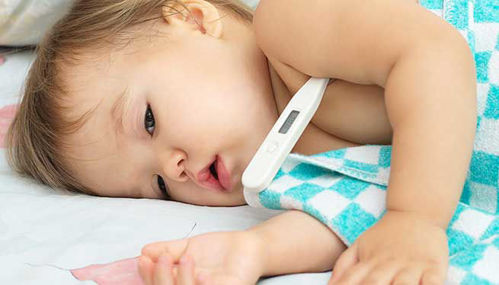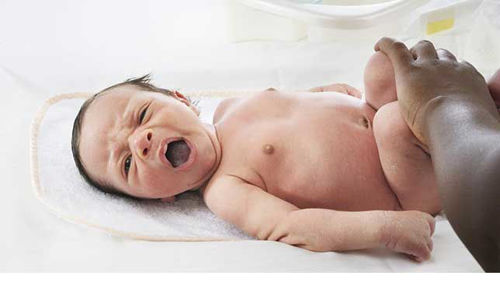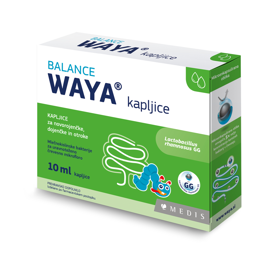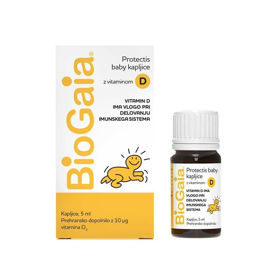Acute diarrhea or acute gastroenteritis is defined as decreased stool consistency (soft or liquid stools) and / or increased stool frequency (? 3 times in 24 hours) with or without fever or vomiting. Acute diarrhea usually lasts less than 7 days and no more than 14 days. The most common causes of acute diarrhea in children are viruses, including rotavirus.

Rotavirus as a cause of epidemics
Due to its high infectivity and easy spread, rotavirus is often the cause of epidemics in kindergartens, nursing homes and hospitals. Rotavirus infection spreads very quickly, so there is a high risk of the whole family getting sick when the first family member gets sick. Rotavirus infections we meet throughout the year, although we have the most of them from November to May. A child can be infected several times, but re-infections are usually milder. It is worrying that 231 children under the age of 5 still die each year in Europe from dehydration caused by acute diarrhea. Rotavirus infections can also be prevented by vaccination, but a vaccinated child can also get diarrhea, which is usually milder.
Where can we get infected most often?
In kindergarten, school or at work. Children from a sibling attending kindergarten or school. Indoors, where a lot of people stay (eg theater, cinema, shopping malls).
How do we recognize rotavirus infection?
As many as 95% of children are infected with rotavirus by the age of 5, and they can be infected 1 to 2 times a year.
The first signs of infection appear 12 hours to 4 days after contact with the virus. They most commonly occur as abdominal pain, vomiting, and fever, which can be very high. This is followed by diarrhea, which is the main symptom. Vomiting and diarrhea can cause dangerous fluid loss, so fluid replacement is essential.
It should be noted that acute diarrhea in a child under 2 years of age can be significantly more severe than in an older child.
Hygiene measures are important!
Rotaviruses are extremely contagious, as they are stable at room temperature and can be kept on children's playgrounds, chairs and tables for several months if they are not destroyed with disinfectants. They also spread through the air.
To prevent the spread of infection are recommended the following measures : children with digestive problems should stay at home for at least a day or two after the problems have stopped; regular and thorough hand washing is extremely important; you can also disinfect your hands several times a day; if the child vomits, everything should be thoroughly cleaned, boiled or thrown in the trash; used diapers should be removed from the apartment as soon as possible; it is also recommended to clean surfaces, toys and objects around the child.
How to deal with diarrhea?
Modern treatment of diarrhea is based on 2 principles and has 2 basic goals:
1. Immediate replacement of fluids and electrolytes and proper maintenance of adequate hydration and electrolyte balance in the child.
2. Adequate diet that prevents prolongation of the period of diarrhea and starvation.
Replacing lost fluid
Fluid replacement is the first and most important measure in diarrhea and vomiting. The addition of rehydration solution prevents dehydration. Signs of dehydration: the child is thirsty, has a dry and cracked mouth, eyes are sunken, skin is pale and cold. The child pees less than usual, the urine is darker in color and may have an unpleasant odor. In mild to moderate dehydration, it is recommended to drink 50 to 100 ml of fluid per kilogram of body weight for the first four to six hours, and then 100 to 200 ml per kilogram of body weight per day until the end of the illness. The rehydration solution prevents dehydration but does not reduce diarrhea.
Digestive regulation
Probiotics are an effective aid in relieving acute diarrhea. Research has proven the effectiveness of probiotics in preventing and treating sudden diarrhea in children and adults.
They have the greatest effect in viral diarrhea (rotaviruses), where they have been shown to reduce the duration of diarrhea7,8 and in diarrhea that occurs as a result of taking antibiotics. In the event of acute infectious diarrhea, the European Association of Pediatricians recommends rehydration with rehydration fluid and probiotic strains that have been shown to be effective in appropriate concentrations. The probiotics that have shown efficacy in various meta-analyzes are Lactobacillus rhamnosus GG (I, A) and Sacharomyces bulardii6 (II, B).
Food
Dietary recommendations during sudden diarrhea emphasize the importance of continuing breastfeeding and the early introduction of a normal diet in the child, no later than 4-6 hours after the onset of rehydration. Breast milk contains many beneficial substances that have a beneficial effect on the rapid recovery and healing of the intestines and the associated nutrition of the child. The baby should be breastfed several times a day, as many times as he wants. For toddlers and older children, we recommend the rapid introduction of a normal balanced diet without dietary restrictions.
When should we take a child with diarrhea to the doctor?
Self-medication is recommended only for children with acute diarrhea. It is also advisable to take into account the child's age; the younger the child, the sooner we recommend a visit to the doctor:
• < 1 year of age: at duration > 1 day,
• < 3 years of age: for the duration of > 2 days,
• > 3 years of age: for the duration of > 3 days.
It is generally recommended that a child with diarrhea that does not improve within 2-3 days be referred to a physician, as in otherwise healthy individuals with acute diarrhea without complications, the condition usually improves within 24 to 48 hours.











